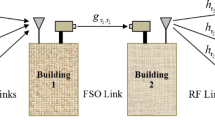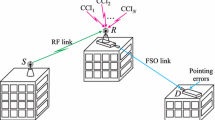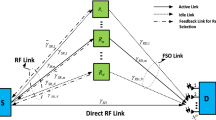Abstract
The generalized order user scheduling is among the efficient user selection schemes which can be used in conditions where the opportunistic scheduling could fail. The opportunistic scheduler could erroneously select a user other than the best user for data transmission or reception due to imperfect channel estimation or outdated channel information issues. In this paper, we study the performance of multiuser mixed radio frequency (RF)/free-space optical (FSO) relay network with generalized order user scheduling. Due to its importance on the system performance, the outdated channel information problem is also addressed in this paper. The considered system includes K sources or users, one decode-and-forward relay and one destination. The users are connected with the relay node through RF links, and the relay is connected with the destination through an FSO link. In the analysis, the first-hop channels are assumed to follow Rayleigh fading model and the second-hop channel is assumed to follow Gamma–Gamma fading model including the effect of pointing errors. Closed-form expressions are derived for the outage probability, average symbol error probability and ergodic channel capacity. Moreover, in order to get more insights about the system behavior, the system is studied at the high signal-to-noise ratio regime where the diversity order and coding gain are provided and studied. Monte Carlo simulations are given to validate the achieved exact and asymptotic results. Main findings illustrate that under weak atmospheric turbulence conditions, the system performance is dominated by the RF links and a diversity order of K − N + 1 is achieved by the system, whereas under sever atmospheric turbulence conditions, the system is dominated by the FSO link and the diversity order is related to the minimum value of the turbulence fading and pointing error parameters.
Similar content being viewed by others
References
Kedar D., Arnon S.: Urban optical wireless communications networks: the main challenges and possible solutions. IEEE Commun. Mag. 42(5), 2–7 (2003)
Chatzidiamantis N.D., Sandalidis H.G., Karagiannidis G.K., Matthaiou M.: Inverse Gaussian modeling of turbulence-induced fading in free-space optical systems. J. Lightw. Technol. 29(10), 1590–1596 (2011)
Laneman J.N., Tse D.N.C., Wornell G.W.: Cooperative diversity in wireless networks: efficient protocols and outage behavior. IEEE Trans. Inf. Theory 50(12), 3062–3080 (2004)
Lee E., Park J., Han D., Yoon G.: Performance analysis of the asymmetric dual-hop relay transmission with mixed RF/FSO links. IEEE Photonics Technol. Lett. 23(21), 1642–1644 (2011)
Ansari I.S., Yilmaz F., Alouini M.-S.: Impact of pointing errors on the performance of mixed RF/FSO dual-hop transmission systems. IEEE Wirel. Commun. Lett. 2(3), 351–354 (2013)
Saquib, N.; Sakib, M.S.R.; Saha, A.; Hussain, M.: Free space optical connectivity for last mile solution in Bangladesh. In: Proceedings International Conference on Education Technology and Computer (ICETC), Shanghai, 484–487 June 2010
Karimi M., Nasiri-Kenari M.: Outage analysis of relay-assisted free-space optical. IET Commun. 4(12), 1423–1432 (2010). doi:10.1049/iet-com.2009.0335
Puri P., Garg P., Aggarwal M.: Outage and error rate analysis of network-coded coherent TWR-FSO systems. IEEE Photonics Technol. Lett. 26(18), 1797–1800 (2014)
Celik, Y.; Odabasioglu, N.: On relay selection for cooperative free-space optical communication. In: Proceedings 17th European Conference on Networks and Optical Communication (NOC). Vilanova i la Geltru 20–22, pp. 1–5 June 2012
Vu, B.T.; Thang, T.C.; Pham, A.T.: Selective relay decode-and-forward QAM/FSO systems over atmospheric turbulence channels. In: Proceedings 9th Symposium on Communication Systems, Networks and Digital Signal Process. (CSNDSP), Manchester 23–25, pp. 407–410 July 2014
Wang, J.-Y.; Wang, J.-B.; Chen, M.; Hut, Q.-S.; Huang, N.; Guan, R.; Jia, L.: Free-space optical communications using all-optical relays over weak turbulence channels with pointing errors. In: Proceedings International Conference on Wireless Communication and Signal Processing (WCSP), Hangzhou,24–26, pp. 1–6 October 2013
Hussain, S.I.; Abdallah, M.M.; Qaraqe, K.A.: Power optimization and kth order selective relaying in free space optical networks. In: Proceedings IEEE GCC Conference and Exhibition, Doha, 17–20, pp. 330–333 (Nov. 2013)
Abou-Rjeily C.: Performance analysis of selective relaying in cooperative free-space optical systems. J. Lightware Technol. 31(18), 2965–2973 (2013)
Chatzidiamantis N.D., Karagiannidis G.K.: On the distribution of the sum of Gamma–Gamma variates and applications in RF and optical wireless communications. IEEE Trans. Commun. 59(5), 1298–1308 (2011)
Wang J.-Y., Wang J.-B., Chen M., Song X.: Performance analysis for free-space optical communications using parallel all-optical relays over composite channels. IET Commun. 8(9), 1437–1446 (2014). doi:10.1049/iet-com.2013.0754
Safari M., Uysal M.: Relay-assisted free-space optical communication. IEEE Trans. Wirel. Commun. 7(12), 5441–5449 (2008)
Pham H.T.T., Dang N.T., Pham A.T.: Effects of atmospheric turbulence and misalignment fading on performance of serial-relaying M-ary pulse-position modulation free-space optical systems with partially coherent Gaussian beam. IET Commun. 8(10), 1762–1768 (2014). doi:10.1049/iet-com.2013.0721
Tang X., Wang Z., Xu Z., Ghassemlooy Z.: Multihop free-space optical communications over turbulence channels with pointing errors using heterodyne detection. J. Lightware Technol. 32(15), 2597–2604 (2014)
Wang, J.-Y.; Wang, J.-B.; Chen, M.; Tang, Y.; Zhang, Y.: Outage analysis for relay-aided free-space optical communications over turbulence channels with nonzero boresight pointing errors. IEEE Photonics J. (2014). doi:10.1109/JPHOT.2014.2332554
Ansari, I.S.; Yilmaz, Fe.; Alouini, M.-S.: On the performance of mixed RF/FSO variable gain dual-hop transmission systems with pointing errors. In: Proceedings IEEE Vehicular Technology Conference (VTC’13-Fall), Las Vegas, 2–5, pp. 1–5 (Sept. 2013)
Ansari, I.S.; Alouini, M.-S.; Yilmaz, Fe.: On the performance of hybrid RF and RF/FSO fixed gain dual-hop transmission systems. In: Proceedings 2013 Saudi International Electronics, Communications and Photonics Conference (SIECPC), Riyadh, 27–30, pp. 1–6 (Apr. 2013)
Miridakis N.I., Matthaiou M., Karagiannidis G.K.: Multiuser relaying over mixed RF/FSO links. IEEE Trans. Commun. 62(5), 1634–1645 (2014)
Gradshteyn I.S., Ryzhik I.M.: Tables of Integrals, Series and Products, 6th ed. Acadamic Press, San Diago (2000)
Ikki S.S., Aissa S.: A study of optimization problem for amplify-and-forward relaying over Weibull fading channels with multiple antennas. IEEE Commun. Lett. 15(11), 1148–1151 (2011)
Vaughan R.J., Venables W.N.: Permanent expressions for order statistics densities. J. R. Stat. Soc. Ser. B 34(2), 308–310 (1972)
McKay M.R., Grant A.L., Collings I.B.: Performance analysis of MIMO-MRC in double-correlated Rayleigh environments. IEEE Trans. Commun. 55, 497–507 (2007)
Wolfram: The Wolfram functions site. http://functions.wolfram.com (2013)
Tan C.C., Beaulieu N.C.: On first-order Markov modeling for the Rayleigh fading channel. IEEE Trans. Commun. 48(12), 2032–2040 (2000)
Simon M.K., Alouini M.-S.: Digital Communication Over Fading Channels, 2nd Edition. Wiley, London (2005)
Vicario J.L., Bel A., Lopez-Salcedo J.A., Seco G.: Opportunistic relay selection with outdated CSI: outage probability and diversity analysis. IEEE Trans. Wirel. Commun. 8(6), 2872–2876 (2009)
Yang L., Gao X., Alouini M.-S.: Performance analysis of relay-assisted all-optical FSO networks over strong atmospheric turbulence channels with pointing errors. IEEE J. Lightware Technol. 32(23), 4011–4018 (2014)
So J.-W., Cioffi J.M.: Capacity and fairness in multiuser diversity systems with opportunistic feedback. IEEE Commun. Lett. 12(9), 648–650 (2008)
Yang L., Kang M., Alouini M.-S.: On the capacity-fairness tradeoff in multiuser diversity systems. IEEE Trans. Veh. Technol. 56(4), 1901–1907 (2007)
Yang, L.; Alouini, M.-S.: Performance analysis of multiuser selection diversity. In: Proceeding IEEE International Conference on Communications (ICC), Paris, pp. 3066–3070 (June 2004)
Author information
Authors and Affiliations
Corresponding author
Rights and permissions
About this article
Cite this article
Salhab, A.M. Performance of Multiuser Mixed RF/FSO Relay Networks with Generalized Order User Scheduling and Outdated Channel Information. Arab J Sci Eng 40, 2671–2683 (2015). https://doi.org/10.1007/s13369-015-1764-0
Received:
Accepted:
Published:
Issue Date:
DOI: https://doi.org/10.1007/s13369-015-1764-0




